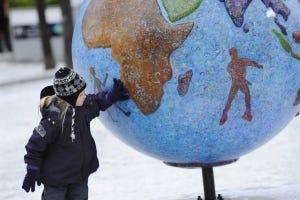Earth Days 2022 Word Search: Climate Crisis Awareness
Test your knowledge of climate related terms by diving into this word search!
To open a new web browser, right click on the image. If you want to print, right click and save the image.
There are 25 words to find!
An organism made from wood; grows to a considerable height
A substance transitioning from a solid to a liquid as a result of prolonged heat, that which also causes sea levels to rise
The term used to describe the enormous variety of life on this Earth
A geographic area where the weather, landscape, plants, animals, and other organisms live and interact with each other
A flammable gas made of methane and other hydrocarbons that are naturally found in the atmosphere and occur underground, and are used for fuel
A prolonged period of abnormally hot weather, often combined with excessive humidity
The release of a substance into the atmosphere
A building or group of buildings in which electricity for a large area is produced; burns fossil fuels which causes pollution
Fuel that is gained from living matter such as plant or algae material, or animal waste
Large bodies of water
The layers of gas surrounding the Earth
A disturbance of the atmosphere marked by wind and usually by rain, snow, hail, sleet, or thunder and lightning
Collecting and reprocessing a resource so that it can be used again
Places that have warm and wet air, causing moderate rainfall
A by-product gas from burning fossil fuels; a greenhouse gas that affects the Earth’s radiative balance
Energy resources that are naturally replenishing such as biomass, solar, wind, etc.
The significant changes in measures of climate, such as wind patterns and temperature, lasting for an extended period of time
Adjustment or preparation of natural or human systems to a new or changing environment which moderates harm or exploits beneficial opportunities
The process of clearing forested lands for non-forest uses; contributes to increasing carbon dioxide in the atmosphere, which causes strain on our oxygen
Gradual thinning of Earth’s ozone layer in the upper atmosphere caused by the release of chemical compounds from human activities
The region including the Arctic Ocean, lands in it, and lands adjacent to it
Animal life characteristic of a region, period, or special environment
The science, art, or practice of cultivating the soil, producing crops, and raising livestock
The persistent worries about the future of Earth and the life it shelters
Work done by several individuals, each doing their part and providing efficiency to the whole effort
THE ANSWER KEY FOLLOWS - ARE YOU SURE YOU WANT TO COMPARE YOUR RESULTS?

Word List:
Tree - an organism made from wood; grows to a considerable height
Biodiversity - the term used to describe the enormous variety of life on this Earth
Natural gas - a flammable gas made of methane and other hydrocarbons that are naturally found in the atmosphere and occur underground, and are used for fuel
Melting ice - a substance transitioning from a solid to a liquid as a result of prolonged heat, that which also causes sea levels to rise
Heat waves - a prolonged period of abnormally hot weather, often combined with excessive humidity
Ecosystem - a geographic area where the weather, landscape, plants, animals, and other organisms live and interact with each other
Biofuels - fuel that is gained from living matter such as plant or algae material, or animal waste
Storms - a disturbance of the atmosphere marked by wind and usually by rain, snow, hail, sleet, or thunder and lightning
Oceans - large bodies of water
Recycling - collecting and reprocessing a resource so that it can be used again
Atmosphere - the layers of gas surrounding the Earth
Emissions - the release of a substance into the atmosphere
Semitropical - places that have warm and wet air, causing moderate rainfall
Power plants - a building or group of buildings in which electricity for a large area is produced; burns fossil fuels which causes pollution
Carbon dioxide - a by-product gas from burning fossil fuels; a greenhouse gas that affects the Earth’s radiative balance
Renewable energy - energy resources that are naturally replenishing such as biomass, solar, wind, etc.
Climate change - the significant changes in measures of climate, such as wind patterns and temperature, lasting for an extended period of time
Adaptation - adjustment or preparation of natural or human systems to a new or changing environment which moderates harm or exploits beneficial opportunities
Deforestation - the process of clearing forested lands for non-forest uses; contributes to increasing carbon dioxide in the atmosphere, which causes strain on our oxygen
Ozone depletion - gradual thinning of Earth’s ozone layer in the upper atmosphere caused by the release of chemical compounds from human activities
The Arctic - the region including the Arctic Ocean, lands in it, and lands adjacent to it
Fauna - animal life characteristic of a region, period, or special environment
Agriculture - the science, art, or practice of cultivating the soil, producing crops, and raising livestock
Ecoanxiety - the persistent worries about the future of Earth and the life it shelters
Teamwork - work done by several individuals, each doing their part and providing efficiency to the whole effort
Created by Samantha Flaherty



